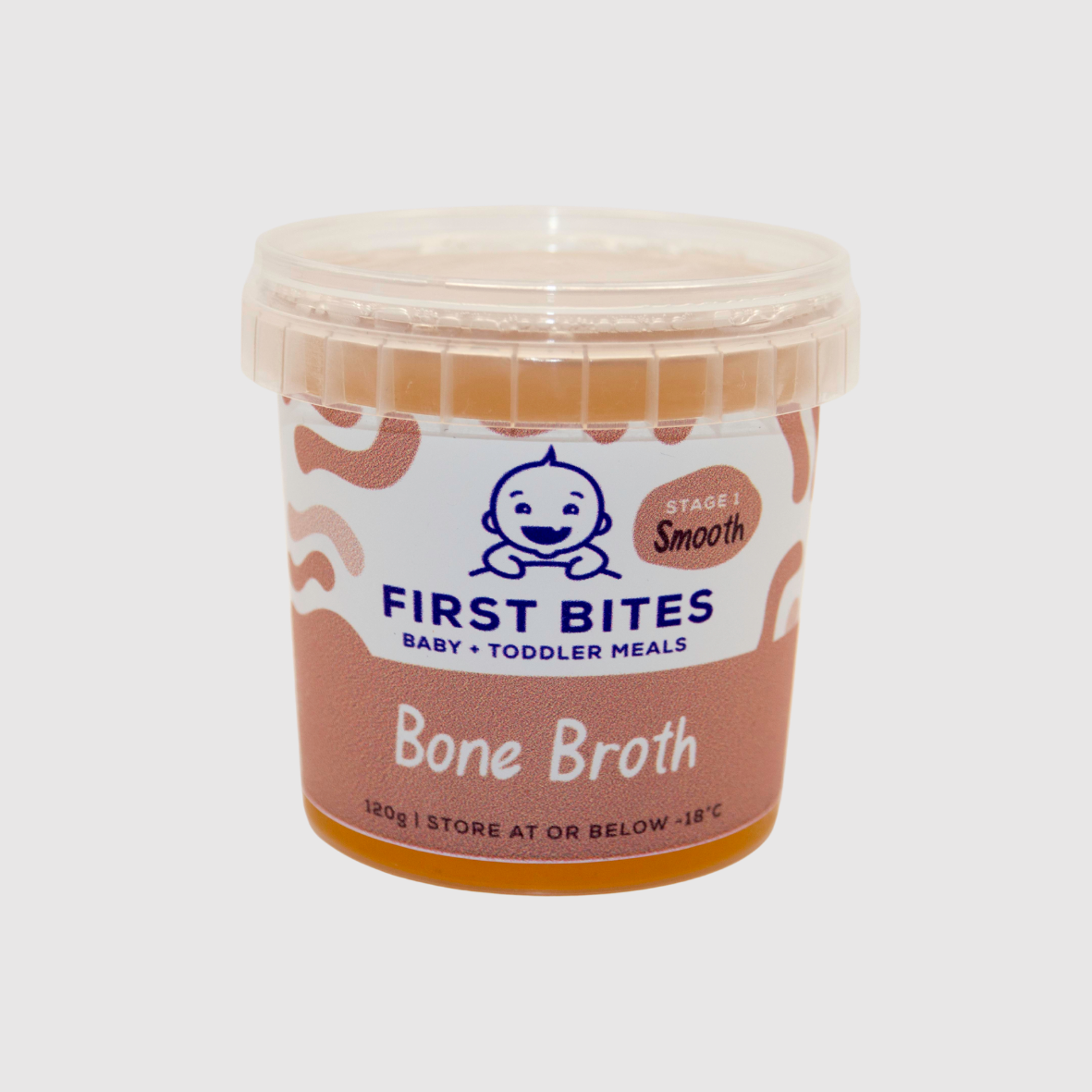Revealing Everything About Bone Broth: Its Duty in Health and Wellness for All Ages
Bone broth has gained interest for its rich dietary account and possible health benefits (bone broth for toddlers). This nutrient-dense liquid is crafted from simmering animal bones and connective cells, providing a mix of collagen, amino acids, and essential minerals. It offers different purposes across various life phases. The specifics of its health advantages and the ideal means to include it into daily dishes remain to be checked out. What makes it a staple for many?
What Is Bone Broth and How Is It Made?
Bone broth is a nutrient-rich liquid made by simmering animal bones, connective tissue, and sometimes meat for a prolonged period. This typical culinary technique has actually been used for centuries across numerous societies, mainly for its taste and health and wellness advantages. The process begins with selecting high-quality bones, frequently from pets like poultry, beef, or fish, which are then incorporated with water and acidic components such as vinegar or lemon juice. This acidity aids remove minerals and collagen from the bones during the simmering process, typically lasting anywhere from numerous hours to days. Different veggies and natural herbs may be included for taste and added nutrients. When cooked, the blend is strained to remove solid parts, leaving an abundant, gelatinous broth. The resulting liquid can be taken in by itself or used as a base for soups, stews, and sauces, making it a flexible addition to lots of dishes.
Nutritional Profile of Bone Broth
The dietary account of bone broth reveals a wealth of beneficial elements that add to its reputation as a health-enhancing food. Rich in collagen, bone broth offers vital amino acids, such as glycine and proline, which play significant functions in maintaining healthy and balanced connective cells. In addition, the broth gives minerals, including calcium, magnesium, phosphorus, and potassium, which are crucial for bone wellness and overall physical features.
The existence of jelly in bone broth help digestion and supports gut health by promoting the honesty of the digestive cellular lining. Various nutrients and antioxidants can emerge throughout the simmering procedure, including to its nutritional worth. Bone broth additionally supplies low-calorie hydration, making it an attractive choice for those looking for to enhance their nutrient consumption without extreme calories. Generally, this nutrient-dense food offers as a versatile enhancement to various diet regimens.
Wellness Perks of Bone Broth
Bone broth is renowned for its nutrient-dense composition, using an abundant resource of vitamins and minerals beneficial for overall health and wellness. Its special buildings support joint and bone health, making it a prominent selection amongst those looking for relief from discomfort. Additionally, bone broth help the digestion system, improving digestive tract health and wellness and advertising better nutrient absorption.
Nutrient-Dense Structure
While numerous foods assert to offer health and wellness benefits, few can match the nutrient-dense structure of bone broth. Rich in necessary nutrients, bone broth gives a concentrated source of vitamins, minerals, and amino acids important for general health. It contains collagen, which can support skin elasticity and advertise digestive tract wellness, along with glycosaminoglycans that aid in cellular function. Additionally, the visibility of minerals such as calcium, magnesium, and phosphorus adds to different physical functions. Bone broth is additionally reduced in calories yet high in protein, making it a beneficial choice for those seeking to improve their diet without excess calories. This diverse dietary account makes bone broth an enticing option for individuals of every ages wanting to boost their wellness and wellness.
Joint and Bone Wellness
Rich in collagen and glycosaminoglycans, bone broth plays a substantial role in advertising joint and bone health. The collagen found in bone broth aids maintain the integrity of cartilage material, which cushions joints and protects against damage. Furthermore, glycosaminoglycans, such as hyaluronic acid, contribute to joint lubrication and elasticity, enhancing flexibility and decreasing pain associated with joint inflammation. try here Normal consumption of bone broth may also support bone density because of its mineral content, consisting of calcium, phosphorus, and magnesium, which are important for solid bones. These nutrients function synergistically to ease inflammation and promote healing in the musculoskeletal system. Including bone broth into the diet may subsequently offer a natural strategy to maintaining joint and bone wellness throughout various life phases.
Digestive System Assistance
Supporting digestive health, bone broth is a nutrient-dense fluid that uses several benefits for the stomach system. Rich in collagen, it aids in the repair of the intestine cellular lining, which can be specifically advantageous for individuals experiencing from problems such as leaky intestine syndrome. The jelly discovered in bone broth aids to take in water and nutrients, advertising optimum food digestion and decreasing swelling in the intestine. Additionally, bone broth is a source of necessary amino acids, which play a crucial duty in maintaining a well balanced microbiome - bone broth for infants. Its comforting buildings can also alleviate digestion pain and assistance general digestive tract health. Integrating bone broth into the diet regimen may boost digestion and add to a healthier, much more resilient digestion system
Just How Bone Broth Supports Intestine Health And Wellness
Bone broth supplies an one-of-a-kind mix of nutrients that can greatly boost intestine health. Rich in collagen, jelly, and amino acids, bone broth sustains the honesty of the intestine cellular lining. Collagen and gelatin aid to repair and preserve the mucosal barrier, which is critical for protecting against leaking gut disorder. Furthermore, amino acids like glutamine play a necessary duty in intestine function by giving power to digestive cells and sustaining their regrowth.
The visibility of minerals such as calcium, magnesium, and phosphorus more adds to digestive tract health and wellness by advertising ideal digestion and absorption of nutrients. Bone broth also includes glycosaminoglycans, which aid to decrease inflammation in the gut, fostering a well balanced microbiome. This combination of nutrients not only help digestion but additionally enhances the body immune system, making bone broth an advantageous addition for people looking for to enhance their general intestine health and wellness and wellness.
Integrating Bone Broth Into Your Diet plan
Integrating bone broth right into one's diet can be both easy and functional. Numerous dish ideas, day-to-day serving pointers, and innovative cooking applications can boost meals while supplying health benefits. Checking out these choices allows individuals to flawlessly incorporate bone broth into their cooking regimens.
Basic Dish Concepts
Numerous individuals are finding the versatility of bone broth as a nutritious addition to their meals. It can easily enhance various recipes, boosting both flavor and health and wellness benefits. For example, utilizing bone broth as a base for soups and stews adds depth and richness while giving necessary nutrients. In addition, it can be included into risottos, replacing water for a creamier texture. Lots of additionally locate success making use of bone broth in sauces and sauces, enhancing their taste accounts. For those seeking a fast snack, drinking warm bone broth spiced with herbs and seasonings offers a comforting choice. It can be combined into healthy smoothies for an unexpected dietary increase, showcasing its flexibility in daily food preparation.
Daily Portion Suggestions
When thinking about just how to flawlessly integrate bone broth into day-to-day dishes, people can check out a selection of methods that enhance both nutrition and taste. One efficient method is to use bone broth as a base for soups and stews, giving a rich, tasty foundation. Additionally, incorporating it into cooking grains, such as rice or quinoa, adds deepness and nutrients. Bone broth can also be eaten by itself as a warm beverage, using a comforting and beneficial alternative. For those who take pleasure in smoothies, a small quantity of bone broth can be added for an extra healthy protein increase. Utilizing it in sauces or sauces can elevate day-to-day recipes while enhancing their dietary profile.

Innovative Cooking Applications
Bone broth uses versatile possibilities for innovative food preparation, allowing home chefs to discover cutting-edge means to enhance their dishes. It can function as a tasty base for soups and stews, enhancing the deepness of taste while offering important nutrients. In addition, bone broth can be utilized in risottos, changing water or stock to give better richness. For those seeking lighter price, it can replace oil in sautéing veggies, including both wetness and taste. In addition, home bakers can incorporate bone broth into bread recipes, producing an unique texture and nutritional account. This component additionally shines in sauces and gravies, where it brings a full-flavored complexity that raises any meal, making it a useful enhancement to different cooking developments.
Bone Broth for Different Age and Lifestyles
Nutrient-rich and flexible, bone broth charms to a vast array old groups and way of livings. For babies, it functions as a beneficial addition to pureed foods, giving vital minerals for development. Toddlers, usually choosy eaters, can gain from its tastes and nutrients, urging healthier consuming behaviors. School-aged children, engaged in active play, discover bone broth click here for more an excellent resource of hydration and power.

Frequently Asked Inquiries
Can Bone Broth Be Frozen for Later Use?
The inquiry of whether bone broth can be frozen for later usage is commonly asked. Yes, it can be frozen, permitting hassle-free storage space and preservation of its nutrients for future cooking applications or intake.
Just How Long Does Homemade Bone Broth Last in the Fridge?
Self-made bone broth generally lasts in the fridge for concerning 3 to 4 days. Effectively saving it in an impermeable container can aid keep its top quality and prevent spoilage within this time structure.

Exist Vegetarian Alternatives to Bone Broth?
The question of vegetarian choices to bone broth commonly develops. can babies have bone broth. Alternatives include veggie broths made from simmered veggies, natural herbs, and seasonings, offering a delicious base for soups and stews without animal-derived ingredients
Can I Make Use Of Bone Broth in Baking Recipes?
Bone broth can be utilized in baking recipes to enhance flavor and wetness. It provides a tasty deepness to breads, soups, and sauces, though adjustments might be essential to balance liquid and spices in the recipe.
Is There a Difference In Between Store-Bought and Homemade Bone Broth?
The difference in between store-bought and home made bone broth lies mostly in top quality and taste. Homemade variations usually consist of fresh components and adjustable spices, while store-bought choices may include preservatives and lack the abundant preference of home prep work.